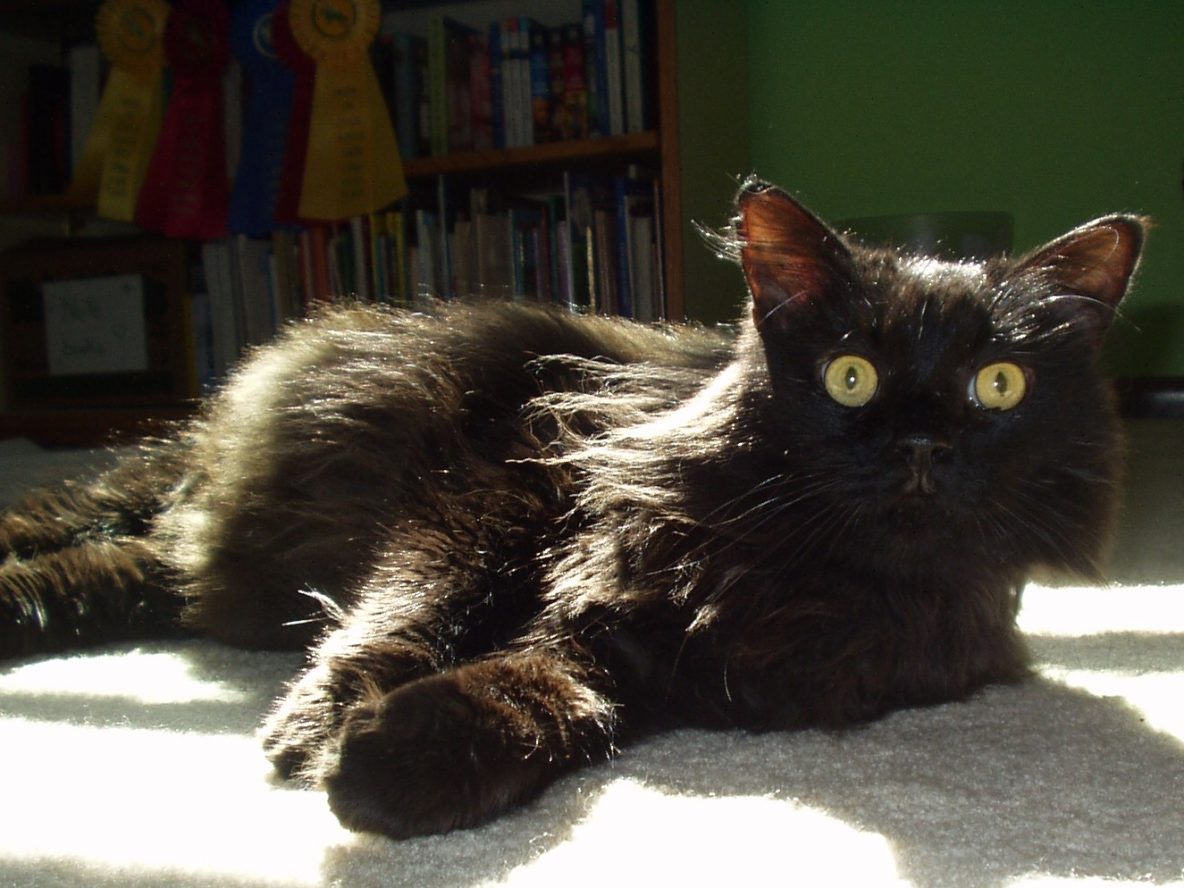People sometimes state that their cat is jealous, or that he is doing something the owner does not like to get revenge. Certainly, cats feel emotions. But jealousy and revenge aren’t emotions. They are complex thought processes that are set in motion in response to emotions. Simply put, a cat does not have the brain power for plotting revenge or feeling that an injustice was done to him.
The Science of Emotions
Scientists are generally in agreement that all mammals, including cats, have emotions. To pet owners this may sound obvious, but it was not proven until recently. A neuroscientist, Jaak Panksepp, has done extensive research on this matter. In addition to doing cutting-edge research, Panksepp is an excellent speaker who explains this complex idea well. References 1 and 4 are easy-to-understand resources that will give you a complete understanding of how Panksepp conducted his research and what he concluded. I’ll give you an overview.
Panksepp studied the neurology of rats, seeing which parts of the brain were engaged by various stimuli. He also elicited behavior by stimulating parts of a rat’s brain. Specifically, he stimulated parts of the amygdala and hypothalamus. These are primitive parts of the brain, meaning that they are found in many primitive animals, as well as in mammals. Panksepp concluded that all mammals have seven basic emotions, which are as follows: seeking/desire, lust, care, play, rage, fear, and panic/grief. Notice that jealousy and revenge are not listed as emotions.
What is Jealousy?
Jealousy is defined by Merriam-Webster as hostility towards someone believed to be enjoying an advantage. I contend that a jealous individual often infers an unfair advantage. Pet owners may attribute this trait to a cat that feels hostile toward a new cat, thinking the cat is jealous because of the owner’s affection toward that cat. Or an owner may say one cat is jealous that the other cat has a sunny windowsill. The cat may feel many emotions, including desire, rage, fear, or panic. But none of these emotions are jealousy. Desire may prompt a cat to try to take a prime nap spot, and a cat may feel rage if the other cat won’t budge from the sunny windowsill or warm lap. Or he may feel fear or panic. But these don’t cause a cat to plot revenge. A cat will react to this situation in the moment. He may later have behavioral problems due to the stress. But this is not jealousy or revenge. To understand this better, let’s examine the brain.
The Cats’ Intelligence
A research paper published in 2016 in London studied the relationship between intelligence and the way different species’ brains are structured. It concluded that the number of neurons in the cerebral cortex corresponds to intelligence (Ref. 1). Mammals process complex thoughts and ideas in the cerebral cortex. This is the outer layer of brain that surrounds the cerebrum, and is also known as gray matter. This is the area of the brain mammals use to learn and to make plans. Even though humans don’t have the biggest brains of all mammals, they do have the greatest number of cortical neurons – about 15 billion. Cats have far less, at 300 million cortical neurons. This is more similar to dogs, which have 160 million (Ref. 1). Cats don’t have the brain power to have as complex thoughts or make as involved plans as we do.
The Brain and Jealousy
Although we don’t know exactly how many neurons it takes to feel jealousy or to plot revenge, they are more complex than basic problem solving. They require more than memory and trial and error. They require more than applying learned problem-solving concepts to a unique problem. What jealousy and revenge require are abstract thought in the absence of the stimulus that created the emotions that kicked off the feelings of desire, etc. Abstract thoughts such as what is fair and unfair, and what another’s state of mine is. Jealousy is based on one’s perception of what an abstract idea such as “fair” means. Choosing what form of revenge to take involves thinking about what another individual might find unpleasant, and laying plans to enact this over time. Abstract thoughts such as these are very advanced forms of thinking.
Think about how much a jealous person may ruminant over their emotions, and the moral dogma they develop and then adhere to regarding right and wrong. Think about how rationalization may be involved. Although research has shown cats feel emotions and are capable of learning and problem solving, as well as remembering what they learned and applying it to novel situations, it appears that only humans have enough cerebral neurons to suffer from jealousy. We must never-the-less attend to our cats’ emotional needs. If they are frustrated because they desire something that is not accessible to them, we must correct that. We must provide enough time and resources for each cat in our household to avoid frustration and boredom. But we need not worry about jealousy and revenge.
You may also enjoy reading my blog on Your Bad Mood Affects Your Cat.
Patience Fisher owns Patience for Cats LLC, a cat behavior business based in Pittsburgh, PA. She is Associate Certified by the International Association of Animal Behavior Consultants. She holds a Bachelor’s in Biology, a Diploma of Feline Behavior Science Technology, and is a certified veterinary assistant. Visit her on Facebook at Patience for Cats.
References:
- Campbell. The Origins of Emotions with Jaak Panksepp. Brain Science Podcast 91, November 30, 2012.
- Colville and Bassert. Clinical Anatomy and Physiology for Veterinary Technicians. Mosby Inc., 2008.
- Dicke, and Roth. Neuronal factors determining high intelligence. Philosophical Transactions of the Royal Society of London B Biological Sciences, 2016 Jan 5; 371(1685): 20150180. doi: 10.1098/rstb.2015.0180
- Panksepp. The Science of Emotions, TED talk at Seattle Rainier, November 9, 2013.


Comments 2
Wrong. Our cat would react to people shooing them from a chair or any action that demeaned their position within the household by going downstairs and pooping on the carpet. This in itself might. Be explainable, but he would sit at the top of the stairway (might come down a step or two to watch you find the fecal matter), then run to defensive positions (under tables, chairs, beds, etc.). This was a very reoccurring performance.
Author
This is a common misconception that I’m glad you brought up. For a cat to poop out of jealousy, you have to assume that the cat knows that poop is distasteful to you. But cats don’t think of poop that way. They smell each other’s poop and butts for information. So pooping as a “punishment” for what you did is not something that fits within their world view. And pooping on the floor as opposed to outside on the ground is a distinction without a difference to them. They do not understand about decomposition outside versus inside. They use litter boxes because they like the substrate and location. (And of course won’t use them if they don’t, which is another long discussion.) Most likely he poops because you shooing him scares him. His defensive position afterwards shows this as well. And he stays on the step then hides because he knows after being shooed you get angry again. He is unlikely to associate your anger with the poop, as that would make no sense to him. And your reaction to the poop probably does not always occur within 3 seconds or less of the bahavior, a timeframe most likely to be connected to an event. Even if it did, he is unlikely to connect pooping in the box means no yelling, and on the floor means yelling. Most likely he just sees you get randomly angry, and if you get angry and shoo you then get angry a second time shortly afterwards. Even if you do not yell, he can tell by your body language that you are angry — body language is the cat’s most often-used form of communication. Please try offering him another seat, and being patient with him as he relocates. Bring a chair or cat condo near to where he is, and lure him with a treat. If he often sits somewhere you want to sit, have another comfy spot nearby, and if you ever see him using it, reward him with a treat, or whatever he may find enjoyable. You could train him to come on cue, as described in my blog. But please don’t shoo him anymore. That apparently scares the poop out of him.